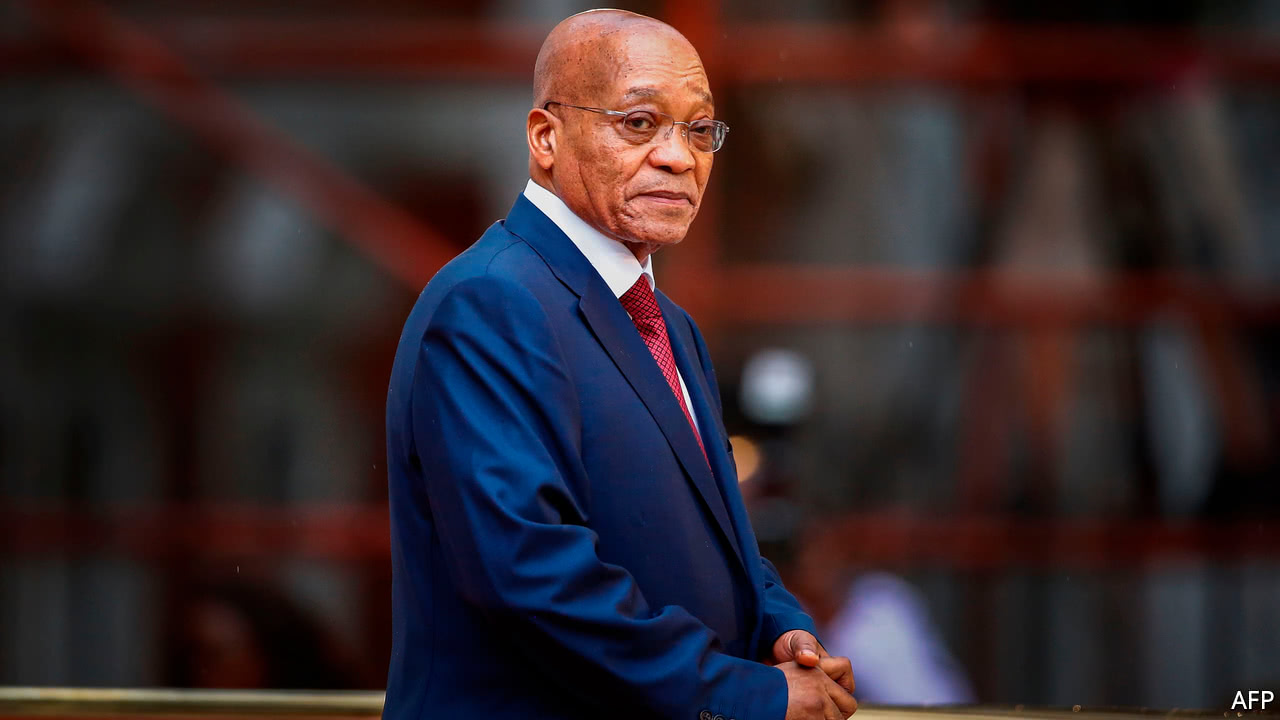 NO ONE expected Jacob Zuma to go gracefully. But as South Africa’s ever-defiant president drags out his final days in office, even his allies in the ruling party have had enough. On February 13th the African National Congress (ANC) said that its national executive committee had “recalled” Mr Zuma as president “with urgency” (under the party’s rules, though not the country’s constitution, all government officials serve at the ANC’s pleasure). In response, Mr Zuma said he would leave office—in three to six months. He had already swatted away an appeal from the six most senior leaders in the party to resign a week earlier. This is in character: shameless and stubborn, he has, over the years, appeared unfazed by damning court decisions against him as well as mass demonstrations demanding that he go. A popular cartoon doing the rounds in South Africa shows a huge crowd of people outside his office. A party colleague says: “It’s the people. They’ve come to say goodbye.” An insouciant Zuma replies: “Where are they going?”
NO ONE expected Jacob Zuma to go gracefully. But as South Africa’s ever-defiant president drags out his final days in office, even his allies in the ruling party have had enough. On February 13th the African National Congress (ANC) said that its national executive committee had “recalled” Mr Zuma as president “with urgency” (under the party’s rules, though not the country’s constitution, all government officials serve at the ANC’s pleasure). In response, Mr Zuma said he would leave office—in three to six months. He had already swatted away an appeal from the six most senior leaders in the party to resign a week earlier. This is in character: shameless and stubborn, he has, over the years, appeared unfazed by damning court decisions against him as well as mass demonstrations demanding that he go. A popular cartoon doing the rounds in South Africa shows a huge crowd of people outside his office. A party colleague says: “It’s the people. They’ve come to say goodbye.” An insouciant Zuma replies: “Where are they going?”
Now Mr Zuma’s days are numbered. He is expected to respond to the “recall” by February 14th, though the party is vague as to what steps it would take should Mr Zuma ignore it. His term doesn’t actually end until 2019 and he is not bound to resign under South Africa’s constitution. The ultimate option to remove him would be through parliament. A vote of no confidence is scheduled for February 22nd. But it was proposed by the opposition Economic Freedom Fighters, a party that splintered from the ANC (and was founded by young ANC members who once supported Mr Zuma). Although it would be painful for the ANC to back an opposition motion, the ruling party may have little choice. It would be more embarrassing to instruct MPs to vote against it, only to have them support an identical motion a few days later. Should the vote pass, the whole cabinet would be forced to resign. This would not be a bad thing, given how many of Mr Zuma’s cronies still hold senior positions.
The end has been nigh for Mr Zuma since December, when Cyril Ramaphosa was narrowly elected as leader of the ANC over Mr Zuma’s preferred candidate, his ex-wife. Mr Ramaphosa, a union-boss-turned-tycoon who decries the corruption that has mushroomed under Mr Zuma, is now South Africa’s president-in-waiting. Mr Zuma would have known where his story was headed, having previously been on the other side of a “recall”. After succeeding Thabo Mbeki as ANC leader in late 2007, Mr Zuma led the campaign that forced Mr Mbeki to stand down as president nine months later. Mr Mbeki, unlike Mr Zuma, bowed to the party and quietly left power.
Mr Zuma is clinging on because he has much to lose. Police investigators and prosecutors have suddenly opened investigations involving Mr Zuma’s friends. After leaving office he will face hefty legal bills related to a number of cases against him. He is facing further charges related to a 1999 arms deal, in which Mr Zuma is accused of 783 counts of corruption.
The delays in dislodging Mr Zuma stem from creaky party process and from Mr Ramaphosa’s lack of an overwhelming mandate. However, even some of Mr Zuma’s staunchest supporters now agree that he must go. One of them, Ace Magashule, the ANC’s new secretary-general, delivered the news about the recall, explaining that Mr Zuma must step down because of “uncertainty and anxiety” in the country. He also argued that Mr Zuma must be treated with dignity and not humiliated. Yet the longer the party allows Mr Zuma to drag out the process, the weaker it looks. “He’s in the back seat, but he’s still driving,” says Susan Booysen, the author of several books about the ANC.
In less than two months since becoming party head, Mr Ramaphosa has bolstered hopes of better times ahead in South Africa. Mr Zuma’s slow defenstration is a distraction from the work of government. At the end of his long and ignominious political career, Mr Zuma is again putting himself before his party and the people.
No comments:
Post a Comment